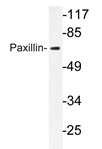Paxillin (PXN) Rabbit Polyclonal Antibody
Other products for "Paxillin"
Specifications
| Product Data | |
| Applications | IF, IHC, WB |
| Recommended Dilution | Western blot: 1/500-1/1000. Immunohistochemistry on paraffin sections: 1/50-1/200. Immunofluorescence: 1/50-1/200. |
| Reactivities | Human, Mouse, Rat |
| Host | Rabbit |
| Clonality | Polyclonal |
| Specificity | This antibody detects endogenous levels of Paxillin protein. (region surrounding Leu25) |
| Formulation | Phosphate buffered saline (PBS), pH 7.2 State: Aff - Purified State: Liquid purified Ig fraction Preservative: 0.05% sodium azide |
| Concentration | 1.0 mg/ml |
| Purification | Affinity-chromatography using epitope-specific immunogen; purity is > 95% (by SDS-PAGE) |
| Conjugation | Unconjugated |
| Storage | Store undiluted at 2-8°C for one month or (in aliquots) at -20°C for longer. Avoid repeated freezing and thawing. |
| Stability | Shelf life: one year from despatch. |
| Predicted Protein Size | ~ 68 kDa |
| Gene Name | Homo sapiens paxillin (PXN), transcript variant 2 |
| Database Link | |
| Background | Paxillin is a focal adhesion phosphoprotein that is localized to the cytoskeleton. Phosphorylation of paxillin has been shown to occur in response to PDGF treatment, v-Src transformation or cross-linking of integrins. FAK (focal adhesion kinase) and PYK2 have been shown to phosphorylate paxillin. FAK phosphorylates paxillin specifically on Tyr 118 in vitro. However, FAK phosphorylation does not seem to be required for the recruitment of paxillin to cell adhesion sites. Paxillin may play a role in signal transduction, regulation of cell morphology and the recruitment of structural and signaling molecules to focal adhesions. It has been shown that the amount of paxillin is reduced in mitotic cells by proteolytic downregulation and that paxillin is alternatively phosphorylated on serine rather than on tyrosine and serine during mitosis. |
| Synonyms | FLJ16691 |
| Reference Data | |
| Protein Families | Druggable Genome, Stem cell - Pluripotency |
| Protein Pathways | Chemokine signaling pathway, Focal adhesion, Leukocyte transendothelial migration, Regulation of actin cytoskeleton, VEGF signaling pathway |
Documents
| Product Manuals |
| FAQs |
| SDS |
{0} Product Review(s)
0 Product Review(s)
Submit review
Be the first one to submit a review
Product Citations
*Delivery time may vary from web posted schedule. Occasional delays may occur due to unforeseen
complexities in the preparation of your product. International customers may expect an additional 1-2 weeks
in shipping.






























































































































































































































































 Germany
Germany
 Japan
Japan
 United Kingdom
United Kingdom
 China
China




